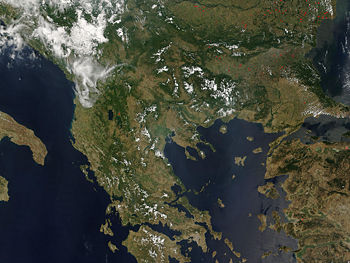Greece: Difference between revisions
Jump to navigation
Jump to search


imported>Martin Baldwin-Edwards No edit summary |
imported>Domergue Sumien (copyedit) |
||
| Line 2: | Line 2: | ||
[[Image:Greece NASA Satellite Photo.jpg|right|thumb|350px|{{#ifexist:Template:Greece NASA Satellite Photo.jpg/credit|{{Greece NASA Satellite Photo.jpg/credit}}<br/>}}|This MODIS Terra image, acquired August 2, 2006, shows most of Greece, with its jagged coastline, and many islands and peninsulas. Also shown are the countries surrounding Greece to the north - from left to right they are Albania, Macedonia, Bulgaria, and Turkey. The red dots on the image denote active fires, which appear to be mostly in Bulgaria. The Peloponnesus peninsula (separated from the mainland by the Isthmus of Corinth), is at the bottom center of the image - the bottom part of it is cut off. To the east of it, at the very bottom of the image, is a small bay, and a gray patch, which is the city of Athens. Near the very center of the image is a three-pronged peninsula - the city of Thessalonica is located at the north end of it. The Ionian Sea is the west of Greece, and the Aegean Sea to the east. | [[Image:Greece NASA Satellite Photo.jpg|right|thumb|350px|{{#ifexist:Template:Greece NASA Satellite Photo.jpg/credit|{{Greece NASA Satellite Photo.jpg/credit}}<br/>}}|This MODIS Terra image, acquired August 2, 2006, shows most of Greece, with its jagged coastline, and many islands and peninsulas. Also shown are the countries surrounding Greece to the north - from left to right they are Albania, Macedonia, Bulgaria, and Turkey. The red dots on the image denote active fires, which appear to be mostly in Bulgaria. The Peloponnesus peninsula (separated from the mainland by the Isthmus of Corinth), is at the bottom center of the image - the bottom part of it is cut off. To the east of it, at the very bottom of the image, is a small bay, and a gray patch, which is the city of Athens. Near the very center of the image is a three-pronged peninsula - the city of Thessalonica is located at the north end of it. The Ionian Sea is the west of Greece, and the Aegean Sea to the east. | ||
]] | ]] | ||
'''Greece''' (Modern [[Greek language|Greek]]: ''Ελλάδα/Ellada'' or formally ''Ελλάς/Ellas'', Ancient Greek: ''Ἑλλάς/Hellas'') is a country in southern [[Europe]]. It has a long history of highly influential high arts, science, and politics dating back to antiquity; indeed Greece is the birthplace of [[democracy]], the [[Olympic Games]], and many great philosophers and writers. Today, it has an area of 131,990 km² and population of over 11 million. The capital is [[Athens]], and the official language is [[Greek language|Greek]]. | '''Greece''' (Modern [[Greek language|Greek]]: ''Ελλάδα / Ellada'' or formally ''Ελλάς / Ellas'', Ancient Greek: ''Ἑλλάς / Hellas'') is a country in southern [[Europe]]. It has a long history of highly influential high arts, science, and politics dating back to antiquity; indeed Greece is the birthplace of [[democracy]], the [[Olympic Games]], and many great philosophers and writers. Today, it has an area of 131,990 km² and population of over 11 million. The capital is [[Athens]], and the official language is [[Greek language|Greek]]. | ||
Revision as of 14:15, 6 October 2008

This MODIS Terra image, acquired August 2, 2006, shows most of Greece, with its jagged coastline, and many islands and peninsulas. Also shown are the countries surrounding Greece to the north - from left to right they are Albania, Macedonia, Bulgaria, and Turkey. The red dots on the image denote active fires, which appear to be mostly in Bulgaria. The Peloponnesus peninsula (separated from the mainland by the Isthmus of Corinth), is at the bottom center of the image - the bottom part of it is cut off. To the east of it, at the very bottom of the image, is a small bay, and a gray patch, which is the city of Athens. Near the very center of the image is a three-pronged peninsula - the city of Thessalonica is located at the north end of it. The Ionian Sea is the west of Greece, and the Aegean Sea to the east.
Greece (Modern Greek: Ελλάδα / Ellada or formally Ελλάς / Ellas, Ancient Greek: Ἑλλάς / Hellas) is a country in southern Europe. It has a long history of highly influential high arts, science, and politics dating back to antiquity; indeed Greece is the birthplace of democracy, the Olympic Games, and many great philosophers and writers. Today, it has an area of 131,990 km² and population of over 11 million. The capital is Athens, and the official language is Greek.